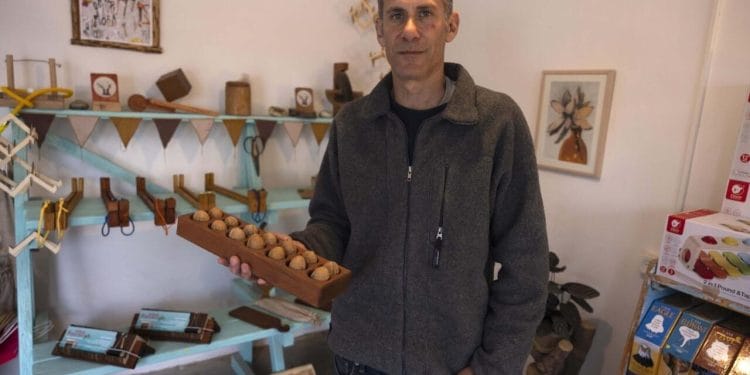[ad_1]
Like the person who returned to stay within the kibbutz the place he was born 43 years in the past, others have returned dwelling, attracted by the brand new alternatives obtainable to them in these former collectivist agricultural villages.
Positioned within the Higher Galilee, close to the border with Lebanon, Hanita, based in 1938, now has round 750 inhabitants.
Created by European Zionist Jews who got here to settle in Ottoman Palestine, then below British mandate, the kibbutz have lengthy represented the dynamism of the younger Israeli state proclaimed in 1948.
“Every thing was widespread”, explains sociologist Youval Achouch, a specialist within the kibbutz, a phrase which suggests “meeting” or “collectively” in Hebrew. “There was no personal property.”
“The kibbutz was probably the most profitable socialist society within the historical past of mankind”, earlier than it declined within the 1980s, assures the teacher-researcher at Western Galilee Educational School in Acre (north) .
Financial difficulties and the autumn of the united states within the 1990s contributed to questioning the cooperative and egalitarian mannequin of the kibbutzim, which have been closely indebted, he stated, resulting in a demographic disaster.
Many younger folks left these villages for town earlier than the looks of recent individualistic values induced the kibbutz to take a liberal flip originally of the 20th century, continues Mr. Achouch.
– From cows to expertise –
The vast majority of the roughly 270 kibbutz within the nation then started a means of “privatization”. “They put aside ideological ideas, socialism, and tried to suit into the encompassing financial system to outlive,” says the sociologist.
Like Hanita, which opened as much as entrepreneurs, the kibbutzim right this moment encourage personal initiatives to draw younger folks and the inhabitants has been rising once more for ten years, underlines Mr. Achouch.
Having gone around the globe earlier than returning a number of years in the past, Mr. Vakrat now runs a store promoting video games and wood objects that he manufactures within the previous metallurgical manufacturing facility.
“Tasks started to emerge for younger folks and this met our wants,” he says.
“I additionally had the chance to purchase an previous home at a great worth and I took this chance”, he says, praising the residing surroundings and the proximity to nature, Hanita being nestled on the prime of a hill, “surrounded by a forest and close to the ocean”.
Based on Gil Lin, CEO of the Kibbutz Business Affiliation, a company that brings collectively and represents the kibbutz, they characterize 40% of the nation’s agricultural manufacturing and 11% of its trade. And they’re now diversifying by investing an increasing number of in actual property and providers.
They’re additionally reinventing themselves via investments within the high-tech sector, the engine of Israel’s economic system, which prides itself on being a “start-up nation”.
In Kibbutz Yiron, within the northeast of Israel, an agro-technological firm, Agroscout, settled a yr and a half in the past within the previous barn, renovated particularly for them.
“There have been nonetheless cows right here 30 years in the past,” Simha Shore, founder and managing director of this firm, which gives technological options to farmers, informed AFP.
“Progressive approaches”
The massive black and white photograph of the barn displayed within the entrance supplies a stark distinction to the present setting.
Glass partitions have taken place within the previous steady room and on the set, workers are immersed of their laptop screens whereas others deal with drones that they’re about to fly above a close-by discipline.
The expertise developed by Agroscout makes it attainable to gather data on crops and detect the presence of pests utilizing drones, satellites or cellphones.
Aided by the Kibbutz Business Affiliation, kibbutzim are studying about expertise and investing in start-ups with which they share the identical “progressive approaches”, Lin stated.
“The kibbutzim have been the primary start-ups” in Israel, he says.
“Israeli tradition is daring and it’s inventive. On the time, the kibbutz embodied this mind-set, right this moment it’s the start-ups”, provides Mr. Achouch.
[ad_2]
Source link







